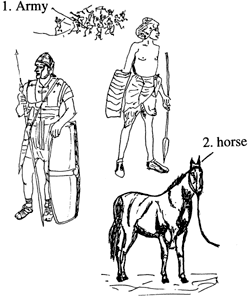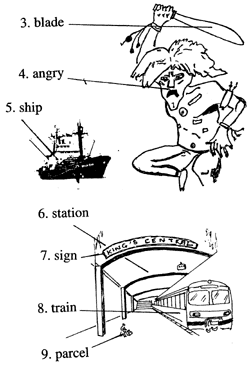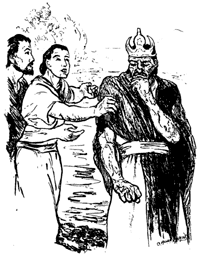Unit 16: Endings In - “ing”
Pictured Words
New Words

| 1. army
|
| 2. horse
|
| 3. blade
|
| 4. angry
|

| 5. ship
|
| 6. station
|
| 7. sign
|
| 8. train
|
| 9. parcel
|
Nouns
Adjectives
Sayings
(now mainly about new words and rules).
A horse has high value.
Gold must be given in payment for it.
There are all sorts of army men.
do not get angry, do not get into a fight.
My friend is missing.
Has he been killed?
It is a good idea to take a journey in a train.
Trains give good comfort now.
Endings In -"ing"
Many words end in -ing.
In this story we have the examples:
In the coming year you will have a son in your arms.
shutting the door on him
shutting the door on the two of them
Stretching himself out on the child seven times.
Words ending in -ing may be both nouns and adjectives.
They help to complete the actions of our 16 verbs.
Where wider English uses many verbs, the same range of things may be said by adding -ing to the noun or adjective that relates to the action.
There may be many nouns ending in -ing, such as hearing, learning, teaching, reading, writing, feeling and others:
Give ear to the teaching of a father.
His blessing is on the tent of the upright.
in running you will not have a fall.
go without waiting
There are also six adjectives with which the ending -ing may be used.
They are: clean, cut, dry, open, separate, and shut.
There are also the adjectives: boiling, hanging, pleasing and waiting.
with a designing heart
Shame is like a wasting disease in his bones.
your vessels overflowing with new wine
sweeter than the dropping honey
Let the words of my mouth be pleasing in your eyes.
Very often the ending in -ing may become an ending in -er:
so is the hater of work to those who send him
A wise son is a lover of teaching .
take them away with the workers of evil
more than the watchers for the morning
The Lord is your keeper.
Words ending in -ing may also be used like adjectives after some form of the verb to be.
They are:
being, coming, doing, getting, giving, going, having, keeping, letting, making, putting, seeing, seeming, taking.
These -ing forms may be followed by whatever may be necessary to complete the statement :
keeping my eyes from weeping
Blessing will be on her food.
coming down to the edge of his robe
lifting up your hands
hanging up our instruments of music

Why Be Washed Here?
Now Naaman, chief of the army of the king of Syria, was a man of high position with his master, and greatly respected, because by him the Lord had given salvation to Syria;
but he was a leper.
Now the Syrians had gone out in bands, and taken prisoner from Israel a little girl, who became servant to Naaman's wife.
And she said to her master's wife, If only my lord would go to the prophet in Samaria, he would make him well.
And someone went and said to his Lord, This is what the girl from the land of Israel says.
So the king of Syria said, Go then;
and I will send a letter to the king of Israel.
And he went, taking with him ten talents of silver and six thousand shekels of gold, and ten changes of clothing.
And he took the letter to the king of Israel, in which the king of Syria had said, See, I have sent my servant Naaman to you;
to be made well, for he is a leper.
But the king of Israel, after reading the letter, was greatly troubled and said, Am I God, to give death and life?
why does this man send a leper to me to be made well?
is it not clear that he is looking for a cause of war?
Now Elisha, the man of God, hearing that the king of Israel had done this, sent to the king, saying, Why are you troubled?
send the man to me, so that he may see that there is a prophet in Israel.
So Naaman, with all his horses and his carriages, came to the door of Elisha's house.
And Elisha sent a servant to him, saying, Go to Jordan, and after washing seven times in its waters your flesh will be well again and you will be clean.
But Naaman was angry and went away and said, I had the idea that he would come out to see such an important person as I am, and make prayer to the Lord his God, and with a wave of his hand over the place make the leper
Are not Abana and Pharpar, rivers of Damascus, better than all the waters of Israel?
may I not be washed in them and become clean?
So turning, he went away in wrath.
Then his servants came to him and said, If the prophet had given you orders to do some great thing, would you not have done it?
how much more then, when he says to you, Be washed and become clean?
Then he went down seven times into the waters of Jordan, as the man of God had said;
and his flesh became like the flesh of a little child again, and he was clean.
Additional Reading
The land where Naaman had his house is a long way from Israel.
So, the journey he took was a very hard one.
He had an army of helpers to give him comfort along the way and to take care of his goods.
Why did he make this long, hard journey?
It was because he had the bad disease we give the name of leprosy to.
If you got leprosy you had to go away from others and live alone, probably in waste lands.
It was as bad as all that.
Naaman was fearful of that becoming his way of living.
How did Naaman get the news of a prophet in Israel?
A little girl told him.
We do not even have her name.
The only knowledge we have of her is that she had lived in the beautiful high country of Israel when she was a little girl.
And she had been made a servant to Naaman's wife by those who took her from her land.
But, she had become a friend to Naaman's wife and was so kind a little girl as to have had thought for Naaman.
That is why he made that long journey.
He was very conscious of the need to get rid of his leprosy.
Now, when Naaman got to the prophet in Israel, he was troubled.
The prophet did not come outside of his house to see him.
No one had ever shown so little respect for him before.
That is why he did not go quickly and take a bath in the slow running current of water in the Jordan river.
He had too high an opinion of himself.
It was necessary for Naaman to get a smaller measure of his own importance.
He had two things wrong with him: leprosy and self importance.
The prophet had help for both.
When Naaman was well again, he was very conscious of his great debt to the prophet.
But it was God who had made him well.
So, Naaman asked for two bags of earth to take back to his own country with him.
It was a common belief in those times that a God lived in the earth of the country.
So, Naaman would have to make his offerings to the God of Israel when he was kneeling on that country's earth.
We now hold the view that the reason for a belief like that was a quite sensible one.
In the Mediterranean countries the soil of some fields grew better plants than others.
There were organisms in them that made them good for plants.
This seemed to say to them that a god lived in those soils.
And, so it was right to make offerings to that god, if you might get the earth on which to do it.
It was a widely held belief that offerings should be made to that god.
Helpful Notes
| leprosy
| a greatly feared disease.
|
| talents
| a money measure.
|
| shekels
| a money measure.
|
| prophet
| a man of god.
|
| make prayer
| be crying to God for help.
|
| waste lands
| hard places for living.
|
| offerings
| something offered to the gods.
|
| organisms
| small living things.
|
| salvation
| the act of being made safe.
|
| Syrians
| a war-like group of those times.
|